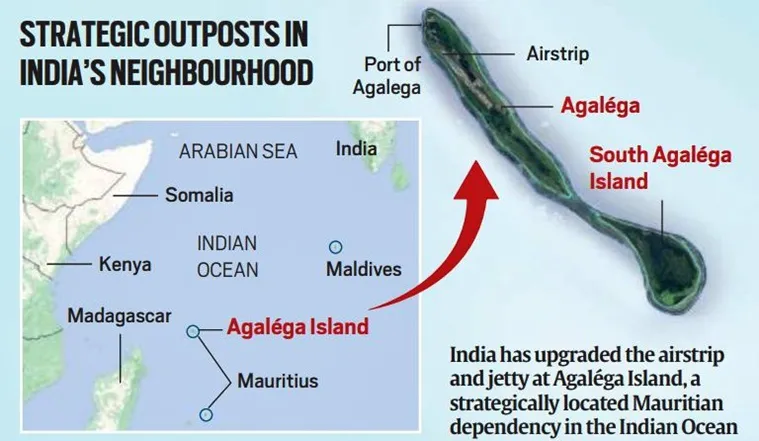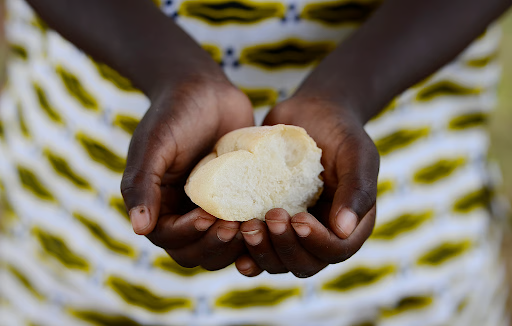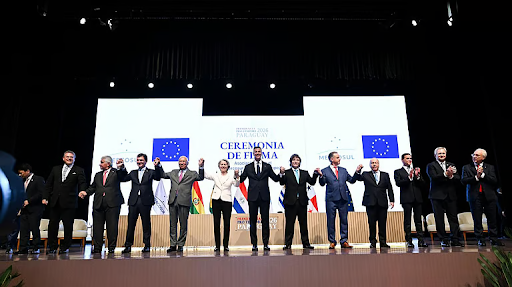Description

Copyright infringement not intended
Picture Courtesy: https://indianexpress.com/article/explained/agalega-airstrip-inagurated-mauritius-maldives-and-india-9189103/
Context: India and Mauritius are collaboratively developing Agaléga Islands, with significant benefits for both nations, addressing socio-economic challenges for Mauritius and reinforcing India's commitment to regional security and growth.
Details
- The development of Agaléga, a remote Mauritian island chain, is a collaborative effort between India and Mauritius. This project has garnered significant attention due to its potential to reshape the strategic landscape of the Indian Ocean.
Benefits for India
- Strategic Location: A developed Agaléga offers India a strategically important foothold in the Indian Ocean. This allows them to:
- Monitor Shipping Lanes: The Indian Ocean is a vital artery for global trade. By having a presence in Agaléga, India can enhance its ability to monitor these crucial shipping lanes.
- Maritime Domain Awareness: Upgraded facilities in Agaléga can be used for deploying surveillance aircraft and sensors, improving India's overall maritime domain awareness in the region. This allows India to better detect potential threats and ensure the security of its vast maritime interests.
- SAGAR Initiative: The project aligns with India's vision of "Security and Growth for All in the Region" (SAGAR). By assisting Mauritius, India strengthens regional cooperation and promotes stability in the Indian Ocean. This can lead to a more peaceful and prosperous maritime environment for all stakeholders.
- Countering China's Influence: Some view this development as a strategic move by India to counter China's growing presence in the Indian Ocean region. China has been actively investing in infrastructure development and port facilities across the Indian Ocean, raising concerns about its long-term intentions.
Benefits for Mauritius
- Infrastructure Boost: The cornerstone of the project involves improvements to Agaléga's airstrip. This could extend to building facilities for better communication networks and potentially a harbour. This upgraded infrastructure can significantly enhance:
- Connectivity: Easier access to Agaléga could attract businesses and tourists. Improved communication links would facilitate trade and investment in the islands.
- Economic Activity: Increased connectivity could lead to the development of new industries in Agaléga, such as tourism, fisheries processing, or handicraft production. This could create jobs and boost the local economy.
- Enhanced Security: India's involvement can significantly strengthen Mauritius's maritime security capabilities. This could be achieved through:
- Joint Patrols: Indian naval vessels and aircraft operating from the upgraded Agaléga airstrip could conduct joint patrols with Mauritian authorities, deterring illegal fishing and piracy in the vast Mauritian Exclusive Economic Zone (EEZ).
- Surveillance: India's expertise in maritime surveillance can be shared with Mauritius, enabling them to better monitor their surrounding waters.
- Sovereignty and Strategic Significance: A more secure maritime environment strengthens Mauritius's sovereignty and strategic position in the Indian Ocean. This can give them greater leverage in international negotiations and regional partnerships.

Potential Concerns
- Environmental Impact: Infrastructure development projects can have unintended consequences on the fragile ecosystem of Agaléga. Careful environmental impact assessments and sustainable construction practices are crucial to minimize any negative impact on the island's unique flora and fauna.
- Militarization Concerns: Some critics worry that the project might lead to the militarization of Agaléga, potentially destabilizing the region. Transparency and open communication between India and Mauritius are essential to address these concerns and ensure the project remains focused on civilian development and maritime security cooperation.
- Local Population Impact: The project's impact on the lives of the Ilois people, the indigenous inhabitants of Agaléga, needs careful consideration. They should be involved in the planning process to ensure the development benefits their community and preserves their cultural heritage.
Way Forward
Collaborative Planning and Transparency
- Joint Working Groups: Establishing joint working groups between India and Mauritius, including representatives from both governments, local communities, and environmental experts, can ensure transparent and inclusive planning.
- Environmental Impact Assessments: Conducting thorough environmental impact assessments before any construction begins is crucial to minimize negative environmental consequences.
- Community Engagement: Engaging the Ilois community throughout the planning and implementation process is essential to address their concerns and ensure the project benefits their lives and cultural heritage.
Sustainable Development Practices
- Renewable Energy: Utilizing renewable energy sources like solar and wind power for the island's energy needs can minimize environmental impact and promote sustainability.
- Eco-friendly Infrastructure: Implementing sustainable construction practices and using locally sourced materials can reduce the environmental footprint of the development project.
- Waste Management: Establishing efficient waste management systems on the island is crucial to prevent pollution and protect the environment.
Regional Cooperation and Security
- Joint Patrols and Training: India and Mauritius can conduct joint naval patrols and training exercises to strengthen their maritime security capabilities in the Indian Ocean.
- Information Sharing: Establishing robust mechanisms for information sharing on maritime threats and activities can enhance regional cooperation and collective security.
- Open Communication with Regional Partners: Maintaining open communication with other regional stakeholders about the project's objectives and avoiding any actions that might be perceived as militarization are crucial to fostering trust and cooperation.
Ensuring Long-Term Sustainability
- Economic Diversification: Focusing on developing a diversified economy in Agaléga beyond tourism can create long-term economic opportunities for the local population and reduce dependence on external resources.
- Capacity Building: Investing in capacity-building programs for the Ilois community can equip them with the skills and knowledge needed to participate in the island's development and benefit from future economic opportunities.
- Monitoring and Evaluation: Implementing robust monitoring and evaluation mechanisms throughout the project's life cycle is essential to ensure its success and address any unforeseen challenges.
|
India-Mauritius Relations
|
|
Key Points
|
Description
|
|
Historical Ties
|
●Pre-1820s: Artisans from India migrated to Mauritius.
●1820s onwards: Large-scale migration of Indian workers for sugar plantations (many as indentured labourers). This shapes Mauritius' demographics (over 68% Indian ancestry).
●Shared colonial history under British rule.
|
|
Political Relations
|
●Established in 1948 (pre-Mauritius' independence).
●Strong and friendly relations built on cultural ties and historical links.
●Regular high-level visits between leaders.
●Mauritius is a key partner in India's SAGAR ("Security and Growth for All in the Region") vision for Indian Ocean cooperation.
|
|
Economic Relations
|
●Trade heavily favours India (surplus for India).
●Major Indian exports: Petroleum products, pharmaceuticals, cereals, textiles, seafood, meat.
●Indian Technical and Economic Cooperation (ITEC) program provides development assistance (training, infrastructure projects).
●Mauritius is a major recipient of Indian Lines of Credit for infrastructure development.
●Investment opportunities exist in both countries for businesses.
|
|
Military Cooperation
|
●India is the preferred defence partner for Mauritius.
●Indian officers on deputation to Mauritian National Coast Guard, Air Force, and Navy.
●Collaboration on joint patrolling, capacity building, hydrological services, and other defence needs.
●India supplies military equipment and platforms to Mauritius.
|
|
Social & Cultural Relations
|
●Vibrant Indian diaspora in Mauritius keeps cultural links strong (festivals, traditions, languages).
●Regular cultural exchange programs (dance, music, art).
●Hindi is widely spoken in Mauritius (the World Hindi Secretariat is headquartered there).
●Many Mauritian students pursue higher education in India (scholarship programs).
●Strong people-to-people ties through tourism and business interactions.
|
|
Development Cooperation
|
●India provides technical assistance through the ITEC program (training in various fields).
●Lines of credit for infrastructure projects.
●Disaster relief assistance in times of crisis (e.g., COVID-19 pandemic, Wakashio oil spill).
●Knowledge sharing and capacity building initiatives.
|
|
Future Prospects
|
●Continued strengthening of political and economic ties.
●Cooperation in emerging areas like maritime security, renewable energy, and blue economy.
●Encouraging two-way tourism and cultural exchange.
●Fostering closer people-to-people ties through education and business partnerships.
|

Conclusion
- The development of Agaléga Island reflects the mutual interests and trust between India and Mauritius, serves the socio-economic and security needs of Mauritius, and aligns with India's broader maritime vision of fostering cooperation and stability in the Indian Ocean Region.
|
PRACTICE QUESTION
Q. Agaléga Island is a part of which country?
A) Madagascar
B) Seychelles
C) Mauritius
D) Comoros
Answer: C
Explanation:
Agaléga Island is part of the country of Mauritius. Mauritius is an island nation located in the Indian Ocean, and Agaléga is a group of two islands that fall within the territorial boundaries of Mauritius. The islands are situated approximately 650 nautical miles north of the main island of Mauritius. While Mauritius is known for its diverse culture, stunning landscapes, and economic activities, Agaléga, though smaller and less populated, holds strategic importance for Mauritius both in terms of socio-economic development and national security.
|








